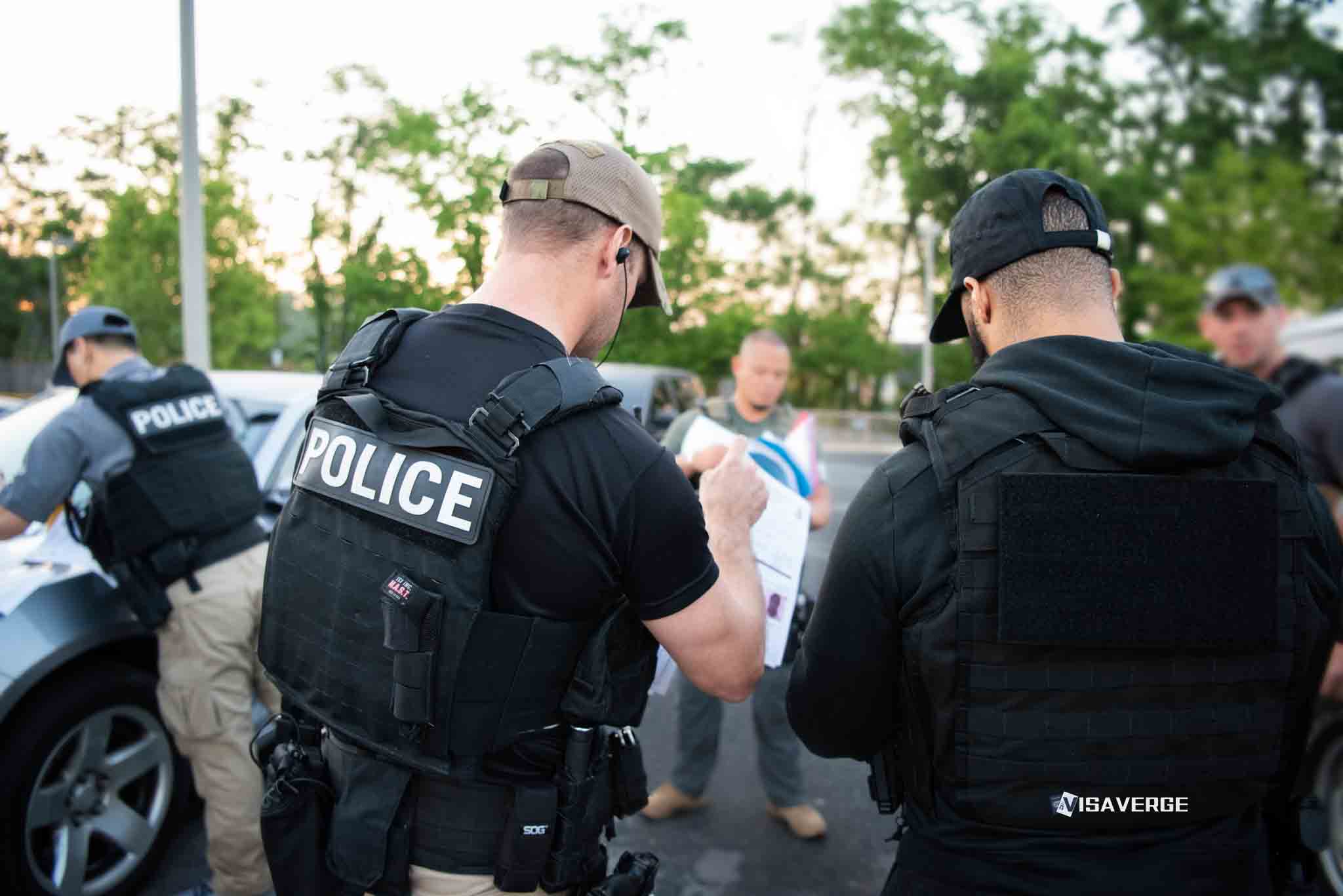Federal immigration agents arrested 243 immigrants across the Denver metro area between July 12 and July 20, 2025, in one of the largest enforcement actions in recent years. ICE says the operation focused on people with criminal records, but advocates and recent data show that many arrested had no criminal convictions, raising concerns about the impact on local communities.
Key Facts from the Operation

During this nine-day operation, U.S. Immigration and Customs Enforcement (ICE) worked with several federal agencies to arrest immigrants charged with or convicted of crimes after entering the United States 🇺🇸 without legal status. According to ICE, the arrests included people with a range of criminal charges and convictions:
- DUI (Driving Under the Influence): 17
- Theft (burglary, robbery, motor vehicle theft): 8
- Assault (aggravated assault, domestic violence): 13
- Drug offenses (including fentanyl distribution): 9
- Sex offenses (including sexual assault, exploitation of a minor): 5
- Homicide (murder, vehicular manslaughter): 2
- Human trafficking: 1
- Other crimes: criminal impersonation, carrying a concealed weapon, false reporting, child cruelty, intimidation, hit-and-run, illegal entry, and illegal reentry
ICE also reported that some of those arrested had links to known gangs and transnational criminal organizations:
- Tren de Aragua: 4
- Los Zetas: 1
- Sinaloa Cartel: 1
- Other organizations: 3
The people arrested came from a wide range of countries, including Mexico 🇲🇽, Venezuela 🇻🇪, Honduras 🇭🇳, Nicaragua 🇳🇮, Colombia 🇨🇴, El Salvador 🇸🇻, Spain 🇪🇸, Chile 🇨🇱, Peru 🇵🇪, Ecuador 🇪🇨, Romania 🇷🇴, Georgia 🇬🇪, Ethiopia 🇪🇹, Kyrgyzstan 🇰🇬, Algeria 🇩🇿, China 🇨🇳, and Jordan 🇯🇴.
At least 50 of those arrested were already subject to removal orders, meaning a judge had already ordered them to leave the United States 🇺🇸.
ICE’s Justification and Federal Partnerships
Robert Guadian, the director of ICE’s Enforcement and Removal Operations in Denver, said the operation was necessary to protect public safety. He stated, “This operation highlights our unwavering commitment to ensuring the safety and security of our communities. By partnering with federal agencies, we have successfully apprehended individuals who pose a significant threat to public safety. We will continue to work diligently to combat crime and uphold the rule of law.”
Guadian also criticized Colorado’s sanctuary laws, which limit local law enforcement’s cooperation with ICE. He said, “Many of the criminal aliens ICE arrested during this operation had been previously released into the Denver metro area by local county jails — directly into the community — because of Colorado’s sanctuary laws that prevent Sheriffs from cooperating with ICE.”
The operation involved several federal partners, including:
- Homeland Security Investigations Denver
- U.S. Customs and Border Protection
- Drug Enforcement Administration (DEA)
- Bureau of Alcohol, Tobacco, Firearms and Explosives (ATF)
- Federal Bureau of Investigation (FBI)
- Internal Revenue Service (IRS)
- U.S. Marshals Service
Federal Policy and Enforcement Trends
The July 2025 operation comes during a period of increased immigration enforcement under President Trump’s administration. Since January 2025, ICE arrests in Colorado have quadrupled. The administration has directed ICE to focus on people who threaten public safety, but the net has widened to include many immigrants without criminal records.
Assistant Secretary Tricia McLaughlin from the Department of Homeland Security (DHS) said the administration is targeting “the worst of the worst.” She also pointed to an 830% increase in assaults against ICE officers and promised continued enforcement, especially in areas with sanctuary policies.
Sanctuary Laws and Local Tensions
Colorado’s sanctuary laws have been in place for several years. These laws limit how much local police and sheriffs can help ICE, unless there is a judicial warrant. Supporters of these laws say they help build trust between police and immigrant communities, making it easier for everyone to report crimes and feel safe.
ICE officials, however, blame these laws for allowing people with criminal backgrounds to be released back into the community. This ongoing disagreement has led to tension between state and federal authorities.
Who Was Arrested? Data and Disputes
While ICE says the operation focused on people with serious criminal records, recent data from the Deportation Data Project and The Colorado Sun show a different picture. In 2025, most people arrested by ICE in Colorado and Wyoming did not have criminal convictions at the time of arrest. The most common conviction among those who did was DUI.
Advocates also report that ICE has arrested more immigrants with no criminal history, including people with pending asylum cases. This has caused fear and confusion in immigrant communities, as families worry about being separated even if they have no criminal record.
Community and Advocacy Response
Immigrant advocates and legal organizations have strongly criticized the broad scope of the ICE operation. Laura Lunn, director of advocacy and litigation at the Rocky Mountain Immigrant Advocacy Network, called the tactics “ruthless” and said she had never seen anything like it in her 15 years of experience.
Advocates say that arresting people without criminal records, including those who are seeking asylum, disrupts families and creates fear in the community. They argue that these actions go beyond targeting public safety threats and instead punish people who are trying to build better lives.
Legal groups like the Rocky Mountain Immigrant Advocacy Network and the American Immigration Lawyers Association Colorado Chapter are offering help to those affected. They provide legal advice, help with immigration court cases, and support for families facing separation.
How the Arrests Happened
ICE coordinated with other federal agencies to gather information and plan the operation. Arrests took place in homes, workplaces, and public spaces across the Denver metro area. People with removal orders are processed for deportation, while others may have to go through immigration court.
After arrest, most people are held in ICE detention centers while they wait for removal or further legal proceedings. If someone has a criminal conviction, they may serve their sentence before being removed, depending on the crime and cooperation from local authorities.
Impact on Immigrant Communities
The operation has had a strong effect on immigrants in the Denver metro area. Many families are now afraid to go to work, school, or even leave their homes. Children worry about their parents being taken away, and community groups report a rise in fear and anxiety.
Some immigrants who were arrested had pending asylum cases, meaning they were waiting for a decision on whether they could stay in the United States 🇺🇸 because of danger in their home countries. Advocates say these arrests make it harder for people to trust the legal process and discourage others from coming forward to seek help.
Legal and Political Challenges
Colorado’s sanctuary laws remain a major point of disagreement between state and federal officials. While no major changes to these laws have happened in 2025, the debate continues. Federal officials argue that sanctuary policies make it harder to remove people who are a threat to public safety. State and local leaders say these laws protect community trust and local priorities.
Legal challenges are also increasing. Advocacy groups are filing lawsuits and public campaigns to push back against what they see as overreach by ICE. They argue that broad enforcement actions harm families and do not make communities safer.
Background: How We Got Here
Colorado has had sanctuary policies for several years, limiting how much local police can help ICE unless there is a court order. These policies were put in place to protect immigrants from being detained for minor offenses and to encourage cooperation with local law enforcement.
ICE’s enforcement priorities have changed with each presidential administration. Under President Trump in 2025, there has been a sharp increase in both the number and scope of arrests, including many immigrants without criminal records. This marks a shift from previous years, when enforcement focused more on people with serious criminal convictions.
What Happens Next?
ICE and DHS have made it clear that aggressive enforcement will continue, especially in sanctuary areas like the Denver metro. As reported by VisaVerge.com, this approach is likely to keep tensions high between federal and local authorities, with immigrant communities caught in the middle.
Advocacy groups are stepping up their efforts to provide legal help and support to those affected. They are also working to inform immigrants of their rights and options if they are arrested or face deportation.
Practical Guidance for Immigrants and Families
If you or someone you know is affected by ICE enforcement actions in the Denver metro area, here are some steps to consider:
- Know Your Rights: Everyone in the United States 🇺🇸 has certain rights, regardless of immigration status. You do not have to open your door to ICE agents unless they have a signed warrant from a judge. You have the right to remain silent and to ask for a lawyer.
- Seek Legal Help: Contact organizations like the Rocky Mountain Immigrant Advocacy Network (rmian.org) or the American Immigration Lawyers Association Colorado Chapter (aila.org) for legal advice and support.
- Stay Informed: Keep up to date with changes in immigration policy and enforcement trends. The official ICE website provides information on enforcement actions, detention centers, and contact details for local offices.
- Prepare a Family Plan: Make sure your family knows what to do if someone is detained. This can include having important documents ready, knowing who to call, and making arrangements for children or other dependents.
Official Resources
- ICE Enforcement and Removal Operations Denver Field Office:
- Website: ice.gov
- General Information: 1-866-DHS-2-ICE (1-866-347-2423)
- Media Inquiries: Contact through official ICE website media page
- Legal Assistance and Advocacy:
Looking Forward: What’s at Stake
The July 2025 ICE operation in the Denver metro area is a clear sign of the current administration’s approach to immigration enforcement. While ICE says it is targeting people who threaten public safety, the reality is more complex. Many immigrants arrested have no criminal record, and the operation has caused fear and uncertainty for thousands of families.
The debate over sanctuary laws and federal enforcement is likely to continue, with both sides holding firm to their positions. For immigrants in the Denver metro and across the United States 🇺🇸, the stakes are high. Access to legal help, knowing your rights, and staying informed are more important than ever.
For more information on ICE enforcement and your rights, visit the official ICE website. If you need legal help, reach out to local advocacy groups or immigration lawyers who can guide you through the process.
As the situation develops, it is important for all affected communities to stay connected, support each other, and seek accurate information from trusted sources. The future of immigration enforcement in the Denver metro and beyond will depend on ongoing legal, political, and community efforts to balance public safety with the rights and well-being of immigrants.
Learn Today
ICE → U.S. Immigration and Customs Enforcement, a federal agency enforcing immigration laws and deportations.
Sanctuary laws → State or local policies limiting cooperation with federal immigration enforcement to protect undocumented immigrants.
Removal order → A legal order requiring an immigrant to leave the United States, usually issued by an immigration judge.
Transnational criminal organizations → Groups operating across national borders involved in serious crimes like drug trafficking and human trafficking.
DUI → Driving Under the Influence, a criminal offense for operating a vehicle while impaired by alcohol or drugs.
This Article in a Nutshell
In July 2025, ICE arrested 243 immigrants across Denver, focusing on crime risk but including many without convictions. Sanctuary laws limited local help, causing friction. The operation impacted families, raising fear and distrust. Legal groups provide support amid ongoing debates over enforcement and community safety.
— By VisaVerge.com













